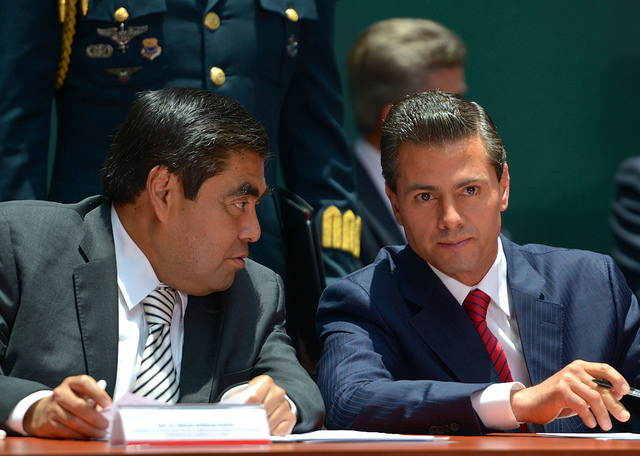Empowered by a political reform that was approved in 2014, Mexico’s top civil society groups, academics and activists gathered last Tuesday in a press conference to present a bill that would establish clear penalties for acts of corruption.
This citizen’s initiative, known as Ley 3de3, could be discussed in Congress as early as this spring, if its proponents can gather the 120,000 signatures required for Congress to include it in the legislative agenda. As Max Kaiser, one of the leaders of the bill’s drafting committee and anticorruption director at the Instituto Mexicano para la Competitividad, argues, “presenting the bill is just a first step…the most important battle will be to collect the signatures.”
As difficult as it seems, the 120,000 signatures may very well be collected. Students, citizens and business communities are all on board. Public and private university deans have offered their tacit support. The hashtag #Yafirmé (I signed) has inundated the web, and one of the main chambers of commerce of Mexico, Coparmex, is asking all of its members to sign the bill. Farmacias Similares, a chain of pharmacies throughout Mexico, has granted permission for their locations to accept the required hard copy signatures of those supporting the initiative. Even El Sopitas, a radio anchor star, is actively promoting signing the bill through his pop music radio program.
The citizen’s initiative is historic – it represents the first time in Mexico’s history that civil society has come together to take legislative processes against corruption into their own hands. “Getting the signatures will not be a piece of cake, but it is doable,” said Amparo Casar, executive president of Mexicanos Contra la Corrupción, an emerging civil society organization devoted to litigating corruption cases in Mexico.
Mexican civil society is now leading the fight against corruption – not by choice, but by necessity. The alternative – following regular legislative procedures and waiting for political parties to present their own bills and discuss them – is no longer an option. Authorities seem to be “just too corrupt to create an anticorruption law with real teeth,” according to Enrique Cárdenas, the coordinator of the drafting committee of Ley 3de3 and the CEO of Centro de Estudios Espinosa Yglesias, a Mexican think tank.
Corruption scandals have been extensively covered by Mexican media, tainting President Enrique Peña Nieto and his cabinet. The most important case occurred in late 2014, when prominent Mexican journalist Carmen Aristegui reported that the president lived in a luxurious home that he had not declared as part of his assets. It turned out that the house was registered under the name of a large government contractor who allegedly had purchased the residence on behalf of Peña Nieto’s wife. The property’s value of 86 million pesos (approximately 4.6 million dollars at today’s exchange rate), raised questions as to whether the first lady, a former soap opera actress, would have been able to afford it.
Public indignation followed when Aristegui was fired, and even more so when Mexican media realized that Finance Minister Luis Videgaray had also acquired a home from the same contractor, at preferential interest rates, before taking office. Both of these cases have been investigated, and authorities have not found reason to prosecute either politician, leaving Mexican citizens disappointed.
Apart from its grassroots character, there are many features that make the citizens’ initiative unique. It would be the first law in Mexico to properly define 10 types of corruption, following United Nations best practices. It creates protections for whistle blowers and incentives for confessors. It creates a framework for coordinating and defining clear obligations for the more than 96 official authorities that currently exist to fight corruption in Mexico. Furthermore, it asks all officials to present declarations of interests and assets, and to prove they pay taxes.
Even if the citizens’ initiative is approved, “this will by no means be the end of the battle,” said Eduardo Bohórquez, director of Mexico’s Transparency International. The Ley 3de3 is just one of the secondary laws that Mexico needs to create by May of this year to provide a legal framework to implement the National Anticorruption System, a coordinated entity to fight corruption that was created last year through a constitutional reform. The reform was backed by some of the same civil society groups as Ley 3de3, using clever mechanisms of public pressure via social media.
Overall, the case of Mexico is a lesson to all Latin American countries: citizens have limits, and when limits are reached, bottom-up change cannot be stopped. There will be many more anticorruption efforts fought by civil society in Latin America if the corrupt continue to operate with impunity. Ironically, in Mexico corrupt officials have been the best inadvertent promoters of legislation to impede corruption.
–
Viridiana Rios is a research fellow at the Mexico Institute of the Wilson Center for International Scholars in Washington, D.C. and has a Ph.D. in government from Harvard University. Follow her on twitter @Viri_Rios





